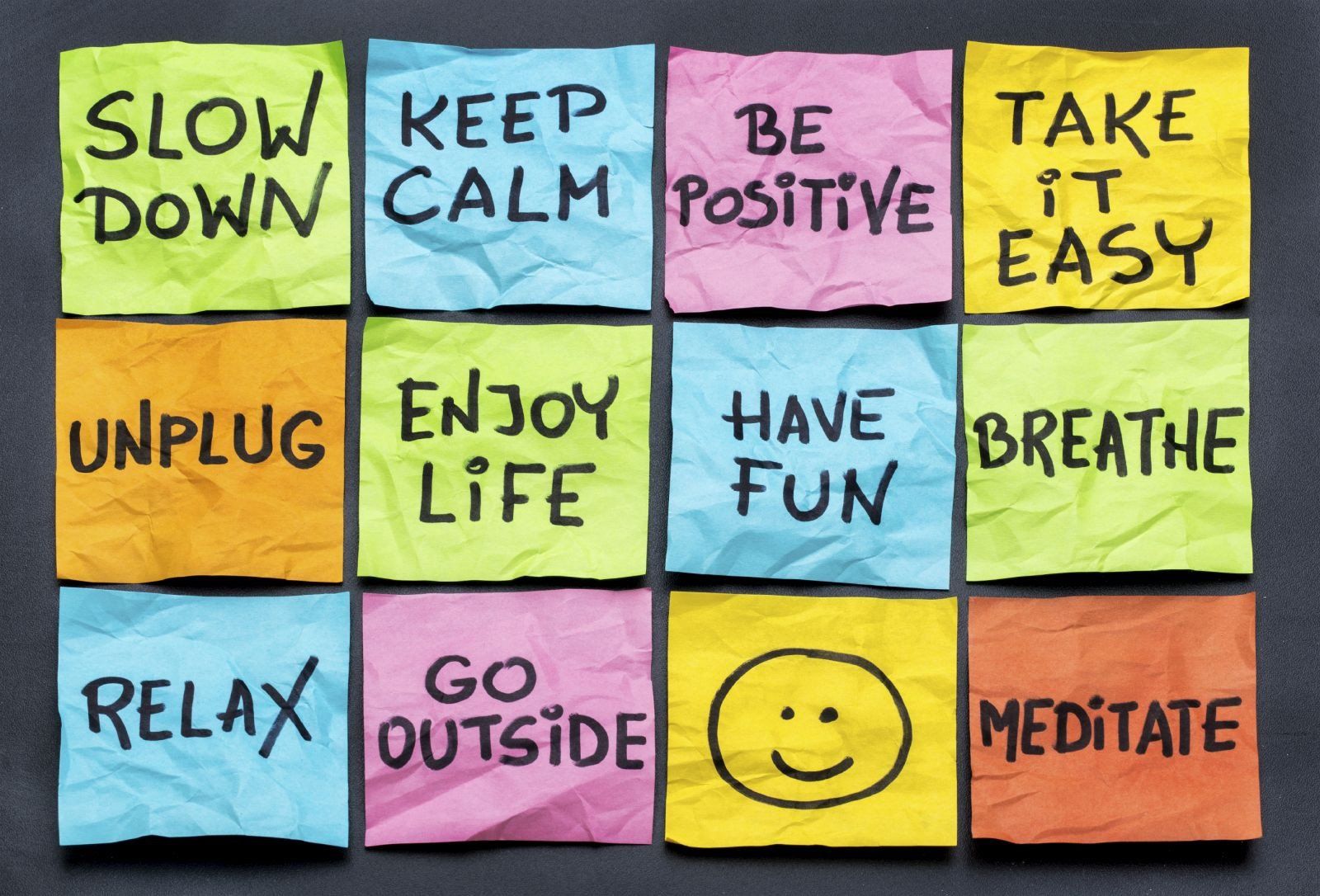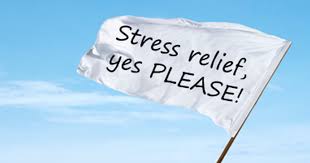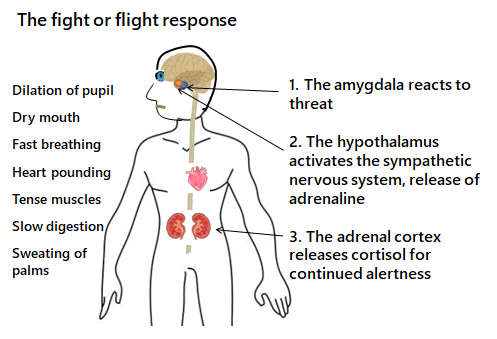AYU-OK Forum
AYU-OK Holistic Health
Your guide to stress relief - when you gain back control, you gain back your health...

It's hard to avoid stress, but learning how to recognise the causes of tension in your life will help you to manage tasks more effectively.
Believe it or not, some stress is good for you. It provides you with energy and motivation, improves your performance, so that you are more likely to achieve your goals, and gives you satisfaction when you have achieved them.
Recognising stress in your life ...
Prolonged stress can have negative effects on your health, however. It drains you of energy and leads to stress-related symptoms, such as headaches and indigestion. Long-term stress raises your blood pressure, increasing your risk of heart disease and having a stroke, and may effect your immunity.
In this blog, you'll start to recognise stress, spot the warning signs, understand the causes, and learn how to reduce your anxiety levels. We will cover different forms of stress relief, including relaxation techniques and complementary therapies.
Try not to let stress build up during the day. Every time you feel stressed, take a 10-minutes break to unwind, remember your health is your wealth.
CONTENTS IN THIS BLOG
- Recognising Stress in you Life
- How do you spot the signs of stress?
- Further causes of everyday stress
- Stress Test - take the test to see how stressed you are
- Your simple 10 minutes De-stresser exercise
- Reduce stress with good communication
- Simple ways to de-stress at work
- Reduce stress with good planning
- Build immunity to avoid stress
- Reduce stress in relationships
- Reduce stress by facing phobias
- The stress-relieving power of music
- A day in the life of stress: your morning
The benefits of stress relief
Stress hormones constrict blood vessels, inhibit the production of endorphins, (natural painkillers) and lower immunity. With the lowering of your stress levels, therefore, you may notice some of the following changes, as your body reverts back to its normal, healthy state:
1. Your heart rate will slow down, your blood pressure will fall and your circulation will improve.
2. Tension in your muscles will ease and you will sleep better. You'll also feel fewer nagging aches and pains.
3. You'll breathe more easily and will be less susceptible to illnesses, such as colds and flu.
4. Your concentration will improve, and you will have more patience for people around you.
Your guide to stress relief
In this blog, you will discover ways in which to avoid and relieve unnecessary stress, improving your quality of life.
1. Planning your stress-free life
One of the keys to reducing stress levels is learning how to manage your time more efficiently and taking firmer control of your life. By better prioritising your time, you will be able to set yourself more realistic goals, freeing up essential time for leisure and relaxation. Ways to achieve this might include setting up helpful routines, for example, tidying up your desk at work at the end of each day, so that you will be more organised for the following morning
2. Learning to relax and unwind
Another important part of keeping stress under control is taking regular timeout to relax. You will learn the importance of splitting your time between work and leisure, so that you get the balance right and learn to prioritise and delegate tasks. You will also discover mew ways to rest and unwind with complementary therapies
and exercises.
3. Building confidence
One way to cope better in stressful situations is to feel more confident and positive about yourself, particularly during conflict with others. Find out how you can be more assertive, allowing you to be effectively challenge the demands made to you by others and deal with difficult situations in a more relaxed manner. This will help you to build on your own strengths and improve on your weaknesses and hopefully, you won't be afraid to ask for help when you need it. In addition, because you'll be more aware of other people's needs as well as your own, your professional and personal relationships will run more smoothly.
4. Laughing out loud
Not only do we laugh when we feel good, the reverse is also true - laughing make us feel good! Laughter causes your body to release endorphins, producing a natural high, boosting your immune system and combating the effects of stress. What's more, learning to lighten up and see the funny side of things will help you to put your problems into perspective.
5. Feeling great
Before long, you'll notice the physical benefits of tackling the stress in your life. You'll feel healthier and more relaxed as you benefit from a better quality of sleep, more energy and even better sex life. Other benefits you are likely to experience include a stronger immune system, more efficient digestive system and lower blood pressure, reducing your risk of many long-term illnesses. You'll also see the psychological benefits of lowering your stress levels, as you'll feel less anxious and more confident.
By learning how to control the stress in your life and finding ways to relax, you will notice a number of positive changes in your physical and mental health.
HOW DO YOU SPOT SIGNS OF STRESS?
Stress is a symptom of the disruption of your physical, mental or emotional well-being. All of us experience stress during our lives. In fact, it can often help us to perform beyond our normal capability. Stress is sometimes described as the body's 'fight or flight' response. When you have a stressful experience, your brain stimulates the production of adrenaline, increasing your heart and breathing rate and readying your muscle for action.
The effects of stress
During periods of prolonged stress, your hormones and energy levels will become depleted and your immune system weakened. Too much stress can cause depression, panic attacks, mood swings and phobias.
There is no formula for a stress-free life, but once you acknowledge that you are stressed, you can learn strategies to manage it and work towards a more relaxed lifestyle.
Once you understand the causes of stress, you can being to minimise its influences on your life.
Many of us, from all over the world and from all walks of life, are having to deal with financial stress and uncertainty at this difficult time.
Whether your problems stem from a loss of work, escalating debt, unexpected expenses, or a combination of factors, financial worry is one of the most common stressors in modern life.
But there are ways to get through these tough economic times, ease stress and anxiety, and regain control of your finances.
The cause of stress in your life
Stress can be caused in every area of your life, from work to relationships.
IN DAILY LIFE
Life is now busier than ever, and when new technologies breaks down, it aggravates a stressful situation. Fitting too much into a day leads to disorganisation and stress.
AT WORK
Situations at work such as an unmanageable workload, conflicts with colleagues or lack of support can make work very unpleasant. Whatever your ambitions or work demands, there are steps you can take to protect yourself from the damaging effects of stress, improve your job satisfaction, and bolster your well-being in and out of the workplace.
AT HOME
Your home is supposed to be a retreat from the stress of the outside world, but sometimes it can cause you even more stress. Relationship problems, moving to a new house, noisy neighbours or even a leaking sink can increase stress levels.
TRYING TO FIT TOO MUCH INTO YOUR DAY IS A COMMON CAUSE OF STRESS
Here are some of the most common causes of stress with solutions and strategies on how to overcome them.
Not having enough time. ...
Unhealthy lifestyle. ...
Taking on too much. ...
Conflicts in the workplace or at home. ...
Inability to accept things as they are. ...
Failure to take time out and relax. ...
Non-work-related issues.
Stress Symptoms, Signs, and Causes
In today’s fast-paced world, chronic stress is common, but your mind and body can pay a high price. Learn to recognise overwhelming stress—and what you can do about it.
Fight-or-flight response: what happens in the body
When you feel threatened, your nervous system responds by releasing a flood of stress hormones, including adrenaline and cortisol, which rouse the body for emergency action. Your heart pounds faster, muscles tighten, blood pressure rises, breath quickens, and your senses become sharper. These physical changes increase your strength and stamina, speed up your reaction time, and enhance your focus—preparing you to either fight or flee from the danger at hand.
The effects of chronic stress
Your nervous system isn’t very good at distinguishing between emotional and physical threats. If you’re super stressed over an argument with a friend, a work deadline, or a mountain of bills, your body can react just as strongly as if you’re facing a true life-or-death situation. And the more your emergency stress system is activated, the easier it becomes to trigger, making it harder to shut off.
If you tend to get stressed out frequently, like many of us in today’s demanding world, your body may exist in a heightened state of stress most of the time. And that can lead to serious health problems. Chronic stress disrupts nearly every system in your body. It can suppress your immune system, upset your digestive and reproductive systems, increase the risk of heart attack and stroke, and speed up the ageing process. It can even rewire the brain, leaving you more vulnerable to anxiety, depression, and other mental health problems.
Health problems caused or exacerbated by stress include:
- Depression and anxiety
- Pain of any kind
- Sleep problems
- Autoimmune diseases
- Digestive problems
- Skin conditions, such as eczema
- Heart disease
- Weight problems
- Reproductive issues
- Thinking and memory problems
COMMON STRESS SYMPTOMS
If you are suffering from some of these physical, mental or emotional symptoms, you probably are stressed.
EXPLORE YOUR FEELINGS
If you are experiencing more than three of the symptoms in each of the boxes below, chances are you are suffering from stress. You may have been ignoring these feelings and conditions and assuming them to be part of everyday life, but now is the time to examine them more closely and get to the root cause.
EMOTIONAL SYMPTOMS
The mental and emotional symptoms of stress can be extremely serious and should be dealt with immediately:
- Depression and mood swings
- Anger, irritability and tearfulness
- Anxiety, panic attacks and irrational fears
- Loss of concentration
- Decreased confidence and inability to make decisions
- Addictions such as alcoholism or drug dependency
PHYSICAL SYMPTOMS
Physical symptoms of stress can become debilitating and worrying, and you should treat your stress before it incapacitates you:
- Migraine or headaches
- Insomnia, disturbed sleep or nightmares
- Dry mouth, clenching jaw or grinding teeth
- Muscle tension in neck, shoulder and back
- Frequent colds, flu and infections
- High blood pressure
- Increased susceptibility to asthma attacks
- Nausea, constipation or diarrhoea
- Changes in eating habits and gastric ulcers
- Irregular menstrual cycle
- Reduced sex drive
- Fatigue or exhaustion
FURTHER CAUSES OF EVERYDAY STRESS
Major events such as bereavement or illness are obviously stressful. Yet happy occasions, such as getting married or moving house. can also put you under a lot of pressure.
Some pressure in life is necessary, as lack of stimulation is likely to leave you bored. Too much pressure, however, may leave you struggling to cope and developing signs of stress. Reactions to stress vary between individuals and the way in which you deal with it can vary according to the time in your life.
The effects of change
Stress is often related to change - rapid changes are most taxing, as they are hard to control. Slow changes at least give you time to adjust and make preparations but you are at your most vulnerable when several changes occur in a short period of time.
Anything can trigger stress, but often it's the daily grind that affects people the most. Timing is a critical factor in how you cope; some women, for example, cope better with stress after a period, when they are feeling more cheerful, than in the week before it, when they are irritable and tense.
The key to maintaining your health and happiness lies in recognising and dealing with the cause of stress.
Fight or flight instincts
The 'fight or flight' reaction to stress is triggered by adrenaline. Without this hormone, you wouldn't experience stress and would actually be less able to cope with the trials of life. Stress triggers the release of adrenaline from your adrenal glands (above each kidney) into your bloodstream.
ADRENALINE HELPS YOU TO REACT TO CAUSES OF STRESS
RED ALERT
Adrenaline causes your whole body to go into red alert. Your pulse, blood pressure and heart rate increase supplying more blood to your muscles and brain and less blood to your intestines. Your muscles become tensed and ready for action, and you breathe more deeply, preparing your body for combat or escape. At the same time, your body also produces a hormone called noradrenaline, which lowers your blood pressure and gradually helps your body return to normal.
The 10 TOP causes of stress
The major causes of stress can be found in all aspects of your life, and the most common triggers are circumstances and listed below:
- Bereavement - is devastating experience that changes your whole life and can release a while host of emotions such as guilt, regret and anger
- Divorce or marital separation - The breakdown of a relationship can be a time of immense change - moving home, changing your finances, explaining the circumstances to your children, and so on.
- Illness or injury - If you are indisposed due to an accident or long-term illness or after surgery, you may feel emotionally low. Worrying about the diagnosis and treatment and later how you will cope with the recovery period, can be extremely stressful.
- Getting married - What should be one of the most exciting days of your life can also be one of the most stressful, due to all the planning involved. The wedding day also feel like an anticlimax after the build-up of the past six months or year.
- Redundancy - Losing your job can knock your self-esteem, as well as cause financial and relationship problems.
- Financial Problems - Financial problems are present in the most families and are often the key cause of arguments between couples.
- Caring for the infirm & elderly - Caring for others can be very rewarding, but it is also physically and emotionally draining. As a carer you may ignore your needs and feel guilty about time out.
- Pressure at work - Every job has its own pressures, including poor time management, a lack of communication or support, bullying and office politics.
- Moving House - Moving house can cause stress and the process of moving can be a constant worry, including finding your home and all the financial implications involved.
- Family Gathering - Family gatherings can be a very trying time, especially if you are not used to being in such close proximity to your relatives.. There can be a lot of pressure to meet expectations, and it is common for people to reach boiling point over issues that seem trivial and small.
STRESS TEST - How Stressed are you ?
If you are used to experiencing stress then the chances are you don't realise the effect it's having on you. Use this simple test to see if you are stressed out.
Sometimes it's very difficult to work out whether you are suffering from the effects of stress. If you experience the symptoms frequently enough then you'll eventually convince yourself that these are normal feelings, which is dangerous because you will be less likely to ever deal with them if you don't see them as harmful.
Monitoring your stress
A good way to gauge your personal stress levels is to take the test. If your results prove positive, however, then the last thing you should do is stress about it! Now that you realise what you're suffering from you can work out a plan to address the problem and look forward to a stress-free lifestyle.
Here are some initial tips on how to maintain stress-free living:
- Manage your time better
- Improve your communication skills so that you can express what you feel
- Learn to say 'no'
YOU CAN BE SO CAUGHT UP IN YOUR DAILY LIFE THAT YOU ARE UNABLE TO SEE THE EFFECTS THAT STRESS IS HAVING ON YOU.
Alternative healing for stress-relief
Many alternative healing therapies target
the symptoms and the underlying cause of a problem such as stress.
Prescribed medicines are not always the best treatments available.
MODERN MEDICINE
Very often we turn to prescribed drugs to treat our conditions, but some of these medications have nasty side-effects and they tend to ignore the root of the problem, whether it be physical or emotional.
You should try and explore some of these alternative therapies to see how they affect your stress levels: hypnosis, herbalism, homeopathy, acupuncture, acupressure, reflexology, osteopathy or shiatsu massage.
Breathing is the only autonomic nervous function that we can consciously have control over. When a person is very stressed they may even stop breathing, and they faint. The subconscious mind then kicks in and picks up the breathing task and the person comes back to a conscious state.
HELPING YOURSELF BATTLE STRESS
Take the stress test to work out your stress levels and then see the stress relievers section to see how you can combat the problem.
STRESS TEST -
Do you know how stressed you are? Take this quick stress quiz to find out, and check your scores in the table below.
RESPONSE
- 1.Never; 2.Sometime; 3.Often; 4. Always
1. I find it hard to get up in the morning and goto work ? {1} {2} {3} {4}
2. I bottle up my feelings until I want to explode? {1} {2} {3} {4}
3. I tend to overreact to the slightest setback or cry easily? {1} {2} {3} {4}
4. I am tired all the time? {1} {2} {3} {4}
5. I feel as though my work/family life is worthless? {1} {2} {3} {4}
6. I am busy all the time, but I don't seem to get much done? {1} {2} {3} {4}
7. I find it hard to sit and read or take time to relax and pursue my hobbies?
{1} {2} {3} {4}
8. I tend to try to avoid confrontations or resolving difficult situations at work or at home? {1} {2} {3} {4}
9. I find it hard to say no to people's requests? {1} {2} {3} {4}
10. I regularly get colds, headaches or other illnesses? {1} {2} {3} {4}
STRESS ANALYSIS RESULTS
(add the numbers together)
10 - 20
- When new or challenging situations arise, you take them in your stride. You manage stress well and don't let it get the better of you. But remember that too little stress can be unstimulating.
21-30
- You get stressed, but its not causing and major health or lifestyle problems. Prevent future problems by adopting some stress strategies.
31-40
- Your stress levels are dangerously high and your health is suffering. Reassesses what's important to you. Reduce stress in your life and use some stress strategies to get calm and healthy.
STRESS RELIEVERS
AROMATHERAPY
- Enjoy the relaxing, uplifting effects of essential oils by adding them to an oil burner, massage oil or a warm bath. The best oils for de-stressing are lavender, bergamot, clary sage, German chamomile, rosewood or sandalwood.
SELF-MASSAGE
- Give yourself a massage with blended oil using a bath mitt or brush. Swap massages with your partner or a good friend. Gentle massage relaxes tense muscles and relieves pain. It also re-balances the nervous system, helping you feel calm and regain perspective.
MEDITATION
- By meditating you focus your mind on one relaxing thought for a period of time. You can focus on your own breathing, an object such as a candle flame, a sound you make or a pleasant image you can conjure in your mind. Sit or lie in a quiet place in order to meditate effectively.
HOLISTIC THERAPIES
- Sound healing, energy healing, looking at your diet, health and lifestyle to check the nutrition in your body all these therapies also help lower stress levels as well as counselling, EFT and coaching. Check out AYU-OK THERAPIES
YOUR SIMPLE 10 MINUTES DE-STRESS PLAN
- Its hard to avoid stress in this modern world, but you can only need 10 minutes to shrug off the worst of its effects, whether you're at home or at work. Stress is hard to avoid in the fast-moving modern world, but there are many ways to deal with it. One of the most important rules is to make sure you don't let small stresses build up into something much more serious. Always ensure that you take a 10-minute break between one stressful task and the next - at home, work or even in your spare time. This will give your mind and body a chance to unwind before you launch into the next potential cause of stress build-up.
Take 10 to unwind
If you're feeling particularly frazzled, try carrying out the simple 10-minute stress relieving exercise we will show you over in this blog. You can carry this out anywhere, at any time - on the crowded journey home, in your workplace, or even in a supermarket queue. You'll be amazed at how quickly in helps you to feel much better.
Try not to let stress build up during the day. Every time you feel stressed, take a 10-minute break to unwind,
PREPARING TO DE-STRESS
Before you start your de-stress exercise, find a suitable area and try to distract your mind from the stresses around you.
FRESH AIR
- If you can, pop outside and find a quiet spot in the fresh air. If you can't, just opening a window will make a difference, even on a bus or train.
AROMATHERAPY
- Flowers with strong scent such as geranium and lavender are good for easing anxiety; place a pot plant on your window sill or desk and let the breeze from outside waft its scent around the room. Place a few drops of essential oil on a hankie and breathe in the scent to help you relax.
SOOTHING SOUNDS
- Play soothing and melodic music; listening to it through personal stereo headphones is fine, or just imagine it in your mind. The gentle sounds of the sea or harmonious instrumental music with few words are best.
DE-STRESS IN 10 MINUTES
1. Gentle breathing (1 minute)
Sit comfortably on a chair, with your back straight and both feet on the ground. If you can't sit down stand as straight as possible without slouching or leaning against anything. Close your eyes and focus on your breathing. Try to let thoughts pass by, rather than pondering on them or daydreaming.
TENSE AND RELAX (4 minutes)
Make a fist with your right hand and tense all your muscles in your forearm. Hold the tension for five seconds and then exhale out of your mouth and relax your muscles for about 10 seconds. Now do the same on thing for each part of your body. Tighten each group of muscles, hold the release exhaling out of the mouth, then relax fully by closing your eyes and focusing on the natural breathe.
VISUALISE (3 minutes)
Next, try to recall a place or time where you felt content and relaxed, Use your imagination to reconstruct the place and how you felt when you were there. It might have been a beach holiday or mountains where you went hiking, Let yourself become totally immersed in the scene.
LET GO (1 minute)
Once your mind and body are completely relaxed, let go of your stress. Visualise a stream of light or energy pouring through your body and washing your stress away, or imagine the stress leaving your body with each breath out. Picture yourself getting through the rest of the day without stress by trying to anticipate and potentially difficult situations. Thinking about how you can get through them calmly will help you to put this into practice.
STRETCH (1 minute)
Keep your eyes closed and breathe in and out deeply. Enjoy the feeling of relaxation and rest. Move your fingers and toes playfully. Then breathe in and stretch your arms up over your head. Stretch your legs out in front of you. Now open your eyes.
PRACTICE RELAXING -The more often you do this 10-minutes stress relief plan, the better. You may be surprised at how relaxed and confident you start to feel, and how relaxed and confident you start to feel, and how the challenging parts of your life no longer feel nearly so daunting and stressful.
CHECKOUT HERBAL HEALTH FOREST
- For herbs and tonics that help relieve stress
REDUCE STRESS WITH GOOD COMMUNICATION
At work and at home, the ability to communicate effectively can improve your relationships and resolve conflicts that cause stress
Good communication is crucial for reducing your stress levels. When we are misunderstood or criticised, we are misunderstood or criticised, we feel isolated and defensive. When conflict arises at home or work and we cannot discuss it in a constructive way, we often feel stressed and angry.
In any situation, let the other person know you are listening by nodding and making eye contact. Respond regularly by saying 'yes' or 'uhuh' and don't be afraid to ask for an explanation if you don't understand.
Dealing with conflict
Remember that constructive criticism in the best way to deal with any conflict. Always refer to the person's actions and behaviours, not to be person, for example 'I disagree with the way you handle your child', not 'You're a bad parent'. Equally, if someone is criticising you, try to listen without becoming defensive.
Clear communication with others will reduce confusion and conflict, as well as lower your stress levels
10 TIPS FOR BETTER COMMUNICATION
1. Talk face to face when possible, to encourage good work relationships
2. Write faxes and emails early in the day, as your communications skills deteriorate as you get tired
3. Listen to what others say even if you don't agree
4. Criticise constructively and try to be specific
5. Try to resolve problems without losing control of your emotions
6. Try not to avoid conflict or touchy subjects - its better to talk in through
7. Try to put yourself in the other persons shoes and listen to what they are saying
8. Express your opinions even if other people don't share them
9. Try not to get upset when someone disagrees with you
10. Admit when you are wrong or angry
EXPRESS YOUR FEELINGS - Its not always possible to avoid stress, but you can learn to cope with it better. Expressing your feelings can dramatically reduce stress levels and enhance your send of well-being.
Explore your feelings
Get in touch with your feelings. Being aware of how you feel - whether its anxious, depressed o angry - is the first step to dealing with stressful problems. This means taking time out from work and family to be alone. Keep a journal, take a walk on the beach or go and see a counsellor or therapist. Be honest with yourself.
Confide in a friend
At time of stress, we all need support from friends and family. If you feel overwhelmed by events, its good to get a new perspective on the problem. Share your feelings with people you trust, so you don't end up feeling exposed and even more stressed. But remember, friends may have their own problems so be prepared to listen as well as talk.
Time is right
Choose a time when the other person can listen - not when they are rushing out of the door. If your friend is too busy, let them know you have a problem and ask if they can set aside some time in the near future for you to talk.
Say what you mean
Never be afraid to say what you think, fell and believe. If you disagree with someone, try to a so. This can be hard if you are afraid they will be upset or angry, but in the long run communicating clearly will lead to better relationships and lower stress levels.
Keep to the facts
Under stress it's easy to distort problems, exaggerate the significance of an event or make sweeping generalisations. When explaining a problem to someone, always be as specific, realistic and objective as you can.
It's okay to cry
Cry when you feel hurt or grief. These feelings are the natural result of change and loss and a good cry can get them off your chest. Make time to honour and express your feelings. Perform a simple ritual like lightening a candle. Not giving yourself time to grieve can cause long -term stress and damage your health.
Saying sorry
Take responsibility for your mistakes and feelings of remorse or guilt,. Making amends will relieve your stress and improve your relationships. Write a card if you cant say it face to face. Once you have righted any wrongs , you'll be able to move on and leave your feelings of guilt behind.
Be kind to yourself
Give yourself time to feel happy! Stressed people often don't take time to laugh and feel pleasure and pride in their own achievements. Tell a friend why you're proud of yourself. Go out and celebrate, or buy yourself a present.
EIGHT STEPS TO WELL-EXPRESSED ANGER
1. Never shout at or hit another person when they are angry
2. Be direct and assertive. Don't express anger in passive ways such as the 'silent treatment'
3. Discharge aggression by hitting pillows or screaming - by yourself. Or do some strenuous exercise
4. Put your anger into words. Before you approach the person, write down 'I am sorry because ...'
5. Tell the person why you are angry in as calm and reasonable tone as possible
6. If you become furious again, ask if you can leave the conversation and come back when you feel calmer and can express your thoughts more clearly
7. Give the other person time to respond. Remember that many people find anger frightening
8 Be brave - expressing anger doesn't have to mean being out of control.
SIMPLE WAYS TO DE-STRESS AT WORK
Even if you love your job, it can still leave you feeling stressed. Many causes of work-related stress can be anticipated however, enabling you to enjoy a more relaxed day.
STRESS
in the OFFICE
builds up when you have a heavy workload, long hours and tight deadlines, conflicts with colleagues or your boss, or lack of support and advice. Unpleasant working conditions such as crowding, constant interruptions, noise pollution or not enough natural light, may also contribute to work-related stress.
Recognising the problem
Its often hard to accept that our own attitudes can contribute to stress at work. If you're an over-achiever, you may have a calendar crammed for too full of activities. If you find it hard to say "no", you may be over-extended and overwhelmed. If you are perfectionist you may find it difficult to delegate work to another person. These sources of stress can be overcome by managing your time better, being more assertive and improving your communication skills
If you tend to worry or criticise yourself, you may be stressed about your job performance and work far too hard.
SIMPLE WORK STRESS - BUSTERS
No matter how much work you have to do, its always good to take a five-minute break between tasks. This gives you the chance to wind down and literally catch your breath. A stress-relieving tonic tea can also ease frazzled nerves
A tonic tea helps to lessen anxiety levels in workplace
PLANNING YOUR STRESS -FREE WORK DAY
The best way to ensure you enjoy a stress-free day is to plan your time carefully. Don't rush things - and make sure you leave yourself enough time to relax.
1, HAVE A STRESS-FREE START
Make sure you start the day in the right frame of mind. Get up early and give yourself plenty of time to get ready. Running for the bus at the last minute, trying to fix your make-up en route and arriving 30 seconds before that vital meeting starts, are all sure-fire ways to begin the day feeling flustered.
2. KEEP YOUR TASKS IN PERSPECTIVE
Break your day into as series of manageable tasks. Instead of thinking of the day as a whole, look at it as 10 separate tasks, and place the in order of importance. If you complete nine of them, not having time to complete the last one probably won't matter
3. BE HONEST ABOUT YOUR CAPABILITIES
Learn to say "no". Be assertive about your needs and don't be afraid t ask for help when you need it. Your colleagues may not realise how much work you have - if you really don't have time to take on another task, they will understand. Don't be afraid to delegate if you don't have time to deal with everything yourself.
4. MAKE SURE YOU TAKE YOUR BREAKS
Have a proper lunch break - away from your desk. Eating health food rather than junk snacks will help keep your stress levels down. Also, taking a break allows you to step back from any problems and will perhaps enable you to see a new way of dealing with them.
5. ADMIT TO YOUR MISTAKES
Take responsibility for your errors and admit them as soon as they happen. There's nothing more stressful than worrying about when your boss is going to find out about your slip up. Being honest about it will go a long way to making amends
6. TIDY YOUR DESK
At the end of each day, take five minutes to tidy your desk. That way you'll know exactly where everything is in the morning and won't waste time trying to remember where you left that vital memo.
7. TAKE CREDIT WHEN IT'S DUE
You have a right to feel happy and proud of yourself sometimes. Stressed people often don't take the time to feel pride and pleasure in their own achievements. Tell your colleagues when you're proud of yourself, and invite them out to celebrate
8. DO THE 10-MINUTE STRESS-RELIEF PLAN
If things do start to get on top of you, remember that you can always do the 10 minute stress-relief (as above)
REDUCE STRESS WITH GOOD PLANNING
Managing your time better puts you in control of your life. Its also gives you a chance to relax, exercise and de-stress.
Most people spend about 80% of their effort on 20% of their results. Better planning would mean that they could achieve just as much in a fraction of the time! Assess hoe you really spend your time and when you are most productive by keeping an activity log for a few days. Schedule tasks that need energy or creativity for the times of the day when you are most alert.
Don't be afraid to delegate!
- Always focus on your priorities. This will highlight the tasks tat have to be done, those that can be delegated and tasks tat can be dropped. Create more time for yourself by saying 'no' to unwanted for unnecessary jobs - this will reduce distractions that take up time you had planned to spend on something else. Turn away unwanted visitors and let people know if you really don't want to be disturbed.
Juggling different tasks can be stressful, but you must accept that you can't work on all of them an once.
TOP 10 TIPS FOR TIME MANAGEMENT
1. Prioritise - Decide which are the most essential jobs
2. Plan ahead - so that jobs are done properly and efficiently
3. Learn to say 'no' - say no to unnecessary or unwanted jobs.
Don't rush email replies, respond properly when you have time.
4. Set deadlines - especially if you tend to procrastinate or leave jobs until the last minute
5. Delegate - to others tasks you don't have time to do yourself. Getting others to help when it's needed is not being lazy!
6. Use email - respond to non urgent queries by email
7. Divert your calls - divert or screen phone calls when you are busy
8. Don't be rushed - into making hasty decisions
9. Accept changes - be flexible, objectives and priorities can change
10. Don't overwork! - ensure that you always take your breaks.
Don't be afraid to say 'no'
Bring more assertive lets you take control of your own life. Saying 'no' sometimes the best way to protect yourself from stress - after all, no one can say 'yes' to everything.
1. LEARN TO SAY 'NO'
We all know what tit feels like to have too much on our plate. Learning to be more assertive about your needs and saying 'no' to extra work can remove the stressful feeling of being overwhelmed. It makes us feel more in control of our lives. How can you expect other people to realise how bus you are unless you tell them?
2. LISTEN TO YOUR INNER VOICE
Notice the times when you want to set your limits and say 'no' but decide not to. Are you afraid of making the other person angry, or of putting your job or relationship at risk? You may be surprised at how many people will respect you for taking care of yourself. It's better to risk an angry reaction than take on too much and do a shoddy job.
3. PRACTICE SAYING 'NO
Keep a log of your positive and negative experiences in setting your own limits. During the week, find two situations in which you can say 'no'. Start small and work up!
4. ASK YOURSELF QUESTIONS
What happened when you say 'no'? How did you say it? What response did you get? Then what did you do? How do you feel about the interaction? Is there anything you still need to do? What you would do differently next time?
Be assertive without saying a word!
EYE CONTACT
Look directly at the person you're speaking to. This conveys a sense of openness and self-assurance. Starting is defensive and looking away or down seems uncertain.
BODY MOVEMENTS
When speaking, move your hands and body fluidly. Keep your movements moderate and not intrusive. Sudden or rapid movements suggest tension and chaos.
POSTURE
Sit or stand your posture open , to send a message of confidence and cooperation. Relax your arms by your sides or on the arms of the chair. Plant both feet firmly on the ground and stand or sit up straight.
PERSONAL SPACE
Everyone has a sense of appropriate personal space and feels uncomfortable when others come too close. To communicate assertively, don't stand too close, but don't back off either. Stand your own ground!
THE ROLE OF NUTRITION IN STRESS RELIEF
Constant stress can deplete your body's store of nutrients and leave you less able to cope with a busy lifestyle. The nutrients most affected by stress are the vitamins B, C and E and the minerals magnesium, zinc, potassium and sodium.
A healthy diet is crucial for helping your body to combat stress.
Vitamin C
is a powerful antioxidant that helps fight damaging molecules called 'free radicals'. It is depleted when you are stressed, so increase your intake of fresh vegetables and fruits.
Vitamin E, another antioxidant is found in seeds and nuts.
B-Group vitamins
are among the best known stress-fighting nutrients, particularly B5. These help support the adrenal glands in times of stress. B-group vitamins are found in whole-grains, green leafy vegetables, shellfish and brown rice.
Magnesium, zinc, potassium and calcium
help combat the confusion and exhaustion caused by stress. Eat whole-grains leafy vegetables and nuts.
BUILD IMMUNITY TO AVOID STRESS
Improving your health by eating well, avoiding toxins and getting enough rest will go on a long way towards reducing the stress in your life.
Stress is frequently used as a blanket term to describe the pressures, tensions and ill-effects you may suffer as a result of a hectic lifestyle. Everyone is subject to stress and while a little can spur you on towards your goals, it is important to recognise your limits. When you are under too much pressure, you can start to feel tired and overwhelmed, but such nervous exhaustion can be avoided by keeping both your body and mind healthy and in balance.
Reduce exposure to toxins
A surprisingly large amount of the stress you experience day-to-day is caused by the toxins you consume or exposed to. Reducing the level of toxins your body has to process will strengthen your immunity to stress. Try to avoid the toxins in cigarettes, alcohol and processed foods and aim for 6 to 8 hours sleep.
Avoid the physical and mental effects of everyday stress by attempting to keep your body and mind in balance.
PLANNING YOUR RELAXING LIFESTYLE
Finding the time to relax, so you can recover from stress before you are bombarded with any more, is essential. Relaxation and exercise will give your mind and body time to recuperate.
1. MAKE TIME TO RELAX
Make a conscious effort to remain calm and prevent tension from building while you are at work. You are legally entitled to breaks on even the busiest days, so make sure you take them. If you're extremely busy, it's better to take breaks during the day and work late rather than work non-stop to ensure you leave on time. Try not to take work home with you and, instead, make time for family, holidays, outing with friends and time alone.
2 GET REGULAR EXERCISE
Regular exercise is the best way to reduce stress. It relieves muscular tension, improves your health, gives you a feeling of well-being and helps you to sleep. You should always see exercise as fun rather than a chore, so choose something you enjoy. If you working hours are unpredictable, take up an activity that doesn't have set times, such as swimming or open classes. This way you wont get stressed if you're late, or feel guilty if you miss a day or two.
3. TAKE A HOBBY
Combat stress by taking up a hobby, such as painting, reading or making furniture. A hobby can calm your emotions and boost your self-esteem. The key factor is to pick an activity that you really enjoy, and only do it when you feel it.
4. PLAN AN ANTI-STRESS DAY
Do your batteries need recharging? Take a day off work and plan it as you like. Sleep in as late as you want to get up and go shopping, have lunch with a friend or play tennis. In the evening, avoid watching the news - read a novel or go to the movies. Enjoy a scented bubble bath before bed.
A STRESS DIARY - Writing a diary is very effective way of 'exorcising' stressful thoughts from your mind. Try to find a least 10 minutes in the evening to write about the events of your day and how they made you feel. Be completely honest and never edit your words!
REDUCING STRESS IN A RELATIONSHIPS
Your relationships with friends and loved one can support you in a stressful times; they can also cause your greatest distress
One of the main causes of stress in relationships is communication breakdown. Unresolved conflict, bottling up your feelings or believing you are not loved, respected, listened to or understood can make you feel isolated, angry and frustrated. Learning to communicate better and express your feelings is essential for stress-free relationships.
Cutting out the stress
Differing attitudes to money can be stressful, particularly in marriage. Honesty and realistic goal-setting will help you to work together. Take your holidays when you earn them and don't work anymore than you must. Make time for your partner, children and friends. Divorce or the death of someone you care about can be tremendously stressful. Allow yourself to be angry, grieve or commemorate the end of your relationship in whatever way feels right.
Human interaction is one of the joys of life, but friends, family, colleagues and strangers can also cause great stress.
RELATIONSHIP STRESS - BUSTERS
1. Dedicate more time to being with your partner, family and friends
2. Buy your favourite person a bunch of fresh flowers
3 Share your feelings, thoughts and beliefs as much as possible.
4. Assert your own needs, even if you are afraid of rejection.
5. Express anger assertively - not with overt or passive aggression as this is never interpreted in a good light
6. Be clear about money and financial arrangements form the outset.
7. Don't avoid conflict or touchy subject. Discuss problems openly.
8. Take time out for yourself; take some private time
9. Keep your promises to yourself and others
10. Laugh a lot; it's the best medicine to keep you healthy.
YOUR GUILD TO LESS STRESS - Practice the three C's communication, compromise and co-operation. They are the keys you need to create harmonious, stress-free relationships...
1. COMMUNICATION
- Increase the communication with your partner to decrease the stress levels; make an appointment with each other and keep it. Sit down together and take turns to have your say, allow your partner 20 uninterrupted minutes to express current feelings about your relationship, bite your tongue if you are tempted to interject. The you speak for 20 minutes. By listening, you may just discover that at least one of your preconceptions abut your partner's behaviours (or your own) is wrong.
2. CUT OUT CONFRONTATION
- Remember that communication is about moving forward, not confrontation. This is true of all your personal relationships - with partners, with family and with friends. If attempts to say what you feel turn into a row, you won't be easing stress, you'll be sending it soaring.
3. COMPROMISE -
is another of the keys to sharing your life harmoniously. There are many common problems that can cause deep rifts and a lot of stress; for example, a dislike of the in-laws. With a little give and take, based on the understanding that one person's in-law is the other's parent, the situation will be eased and a stress flash-point eliminated.
4. CO-OPERATION - will help ease stress. Fighting over every detail of your life together is not only tiring and stressful, it is also extremely destructive. Make a real effort to identify what does matter and, more significantly, what doesn't then let it go.
5. CREATING HARMONY
- never forget the best relationship stress-buster of the lot. The best part of breaking up may be making up, but don't let it get to that. Take time out from everyday life, make time for each other and make love. By rediscovering your pleasure in one another, you'll re-energise your lives together and put the stress-inducing aspects firmly in their place.
PRACTISING RELAXING
If a relationship is persistently causing you stress then you should walk away from it. It's much better to accept that you're simply not suite to one another than to continue to make each other's lives a misery.
A DAY IN THE LIFE OF STRESS: REDUCING MORNING STRESS
Removing stress from your mornings is all a matter of organisation. Just remember the motto 'Don't put off till tomorrow what you can do today'
Organising your morning to be as stress-free as possible is truly the best start to the day. It will help you to feel more in control and save your vital minutes
The mood you are in when you awake if often linked to the way you were feeling when you went to sleep. If you had issues that were unresolved before you turned in, then you will have a bad nights sleep leaving you feeling physically and emotionally drained when you wake.
The morning grind
It is a familiar scenario in every household: your alarm failed to wake you on time so you are already feeling anxious. As your mental clarity returns, the worries that you experienced last night have returned, making your stomach ache. You push it and get up to go to the bathroom, but someone has beaten you to it! Eventually, you're ready to head downstairs for breakfast, but there's no coffee/tea/cereal/toast for you as someone has beaten you yet again and finished the last of it. Getting out of the house is turning into a trial and your day has only just begun.
Getting up and out of your house can send your stress levels soaring
A GOOD NIGHT'S REST
People suffering from stress often have trouble falling asleep and wake feeling unrefreshed. Eight hours of sleep is the standard, but it us the quality of sleep that is most important. Insomnia is often fuelled by symptoms of stress, which produce high levels of adrenaline causing disturbed sleep patterns.
IMMUNE RESPONSE
- Al lack of sleep can have devastating effects on your health. How can your body recover and heal when it is fighting to simple keep you awake? Research shows that a lack of sleep is bad for your immune system and this who experience stressful times and lose sleep are more susceptible to illnesses, which will only serve to further exacerbate feelings of stress.
THE RIGHT ENVIRONMENT
Getting a good nights sleep is vital to ensuring that you wake up in the morning feeling revived. To create a restful sleep environment, ensure that the bedroom is kept cool; sleeping in a room that is too hot can leave you feeling groggy the next morning. Ensure the lighting is dim and that your bed is as comfortable as possible. During your lifetime, you will spend a large amount of time in bed so make sure the mattress you sleep on is comfortable and never more than 10 years old. You could also try burning an essential oil with relaxing properties such as lavender, an hour or so before you go to bed.
CLOTHES PREPARATION
Another way to save time is by sorting out the clothes you will wear tomorrow, today! This means that you will have one less decision to make in the chaos of the morning rush. If you have young children, then doing the same for them is a sure way to avoid getting yourself behind schedule.
DO IT THE DAY BEFORE
Where children are concerned, establishing a routine is essential to a hassle-free morning. Try to organise their lunches before you go to bed the day before. If they need to take items with them to school such as a P.E kit, school bag or permission slips for school excursions, try to sort these out the night before.
LOST GOODS
Try to fix in your house where you can leave the house and car keys, letters that you need to post and your bag, and so on. Not having to hunt around for these items will save you precious minutes when you need them the most in the morning, and removed the stress that this inevitably causes.
SORTING OUT YOUR MEALS
Scrambling around the kitchen for breakfast in not a pleasant activity but there are ways to save time here as well. Maybe you can set up a rota so that people take in turns to set breakfast out. This takes the pressure off you and shares the responsibility. A handy tip is to have a pin board with a pad on it for food items should write it on the list, that way part of your shopping list is already compiled.
AN UNRUSHED CONCLUSION
With all these points, the essence is to give yourself time enough not to rush. Establishing a routine or putting structures in place can help everyone to get out of the house with everything they need and without causing delay. By implementing these points and planning ahead, you can help minimise any confusion created first thing in the morning.
REDUCE STRESS BY FACING PHOBIAS
When you know what you fear, you are one step closer to overcoming its effects, but it's harder when you harbour a genuine phobia
Phobias seriously effect about one in 10 people, but many more of us claim that we have them. Phobias are intense, irrational fears that fall into three categories: specific phobias, where the fear is linked to a particular object or animal, such as dogs; social phobia, where the sufferer has a fear of being humiliated or embarrassed in front of other people; and agoraphobia, a fear of being alone in a situation from which they can't escape this includes fear of crowds.
Symptoms of irrational fear
People who suffer from phobia report panic symptoms including feeling od terror, light-headed, a pounding heart, shortness of breath and an overwhelming desire to run away. Most people with phobias recognise that the terror they experience is out of proportion to the actual danger posed (that their fear is, in fact, irrational), yet they may find that the fear is so deep-rooted that it dramatically affects their ability to conduct a normal life.
Phobias can become all consuming and will take a prominent position in your life if they are not tackled.
The most common phobias
There are hundreds of phobias, but the most common ones are:
- Heights (acrophobia)
- Spiders (arachnophobia)
- Darkness (nyctophobia)
- Snakes ( opitophobia)
- Flying (aerophobia)
- Dentist (dentophobia)
- Public speaking (glossophobia)
- Injections (trypanphobia)
- Blood (haemophobia)
Common phobia may relate to a genuine threat but are extreme reactions.
BASED IN REALITY
Phobias frequently relate to objects or situations that can pose a genuine danger, for example snakes or deep water. Often, phobias can be traced back to childhood.
You may have been influenced by someone else's fear, for example, you may have 'learned' your mother's fear of dogs. Sometimes a phobia may be traced back to a single frightening incident, such as being bitten by a dog. When a phobia becomes so overwhelming as to make you change your behavior, it's time to face your fears.
Overcoming your fear
Use this step-by-step guide as often as necessary to begin conquering your fears. Small efforts will lead to big changes when you start taking action against your phobia.
1. ASSESS YOU PHOBIA - Think about what makes you feel panicky and scared. Once you have determined exactly which situations cause you to fear you can start to take steps to overcome your phobia.
2. FACE YOUR FEAR - Some phobias, such as a phobia of snakes, don't affect your daily life, but if someone has to avoid dogs, cats, lifts or crowds it can be more difficult. Avoiding fear often reinforces it and makes future encounters worse. Start to desensitise yourself to the fear before you face the real thing. For example, if you have a phobia of spiders, start by looking at pictures of them for a few seconds, and graduate on to the real when you're ready.
3. CONTROL YOUR BREATHING - The simplest way of staying calm is to control your breathing. Breathe in slowly and deeply to the count of eight, then breathe out slowly to the count of six. Measure your breathing so that your mind is concentrating on your inhalations and exhalations rather than on your fear.
4. STATE AFFIRMATIONS - Create affirmations to match your phobia. Repeat reassuring statements such as 'This dog isn't going to hurt me'. A rational approach to your fear will help you to overcome the feelings of panic.
5. BOOST SELF-ESTEEM - When phobias aren't serious enough to warrant medical treatment there are ways that you can help yourself. Boost your self-esteem and general confidence by enrolling in course such as public speaking or simulate flying to clear the fear.
SEEKING PROFESSIONAL HELP - CLICK TO FIND OUT MORE
Neuro-linguistic Programming
(NLP - aims to change the though pattern that holds the phobia in place, helping you to gain control over your mind.
Hypnotherapy
- In an hypnotic state you can hear and respond but aren't fully conscious. The origins of the fear are identified and negative thoughts are changed into positive ones by suggestions.
Though Field Technique (TFT)
- Based on the the theory that fears are hels within the body, FTF uses a pre-determined series of gentle finger tap on acupuncture points to remove anxiety also known as EFT (Emotional Freedom Therapy).
THE STRESS-RELIEVING POWER OF MUSIC
The soothing qualities of music make it am ideal tool for stress relief. Music can help to improve energy flow and balance fraught emotions
From the moment life begins, it plays out to a backdrop of music - the steady, rhythmic beat of a mother's heart and the gentle rush of blood through her veins. A 17th-century poet said that "music has charm to soothe a savage beast". However, the history of music as a therapeutic medium can be traced far further back, and its power to heal extend beyond "the savage beast".
Developing the theory
Our relationship with music can be traced back to the Neanderthals, who made simple flutes, but it appears to have been ancient Greeks who first made a connection between music and healing. declaring that "music is an art imbued with power to penetrate into the very depths of the soul". Formal use of music as therapy began when it was discovered to have a positive effect on injured soldiers returning from WW II, and it now helps to treat many conditions, from anxiety to autism.
Music has long been recognised to have healing qualities and is now widely used as a complementary medicine.
MUSIC THERAPY AROUND THE WORLD
The sounds may differ and the instruments be unfamiliar, but music of all sorts has been used through the ages to heal and rebalance. In Tibet, it made by bells, chimes and singing bowls in Bali by the gong and the drum. Common to almost every major culture is chanting, to harmonise body and soul using the vibrations of sound.
DRUMS
- The insistent beat of the drum is used worldwide - in West Africa, dance is combined with drumming to correct the irregular rhythm believed to block energy flow.
DIDGERIDOO
- Using sound to alter the body's energy field is also the principle behind the Aboriginal didgeridoo, a unique instrument whose sound induces a trance-life state in listeners.
HOW MUSIC AFFECTS THE BODY
One theory about how music works to heal the body is that, because music is processed only by the right side of the brain, it helps to suppress the left side, where anxiety and disease reside. It is also believed that music stimulates the brain to produce serotonin, without which we often feel low, and melatonin, which helps us to sleep.
STRESS RELIEF
Linked to this is stress reduction. Stress is believed to be a factor in the majority of disease, and it has been discovered that music has a part of play in stress reduction, too biofeedback researchers have found that drumming in the tomes to our won heartbeat for just 15 minutes can make a significant difference to stress levels.
PAIN MANAGEMENT
These positive effects are now used increasingly to help with pain management and stress-related conditions, for example in childbirth, and to improve post-operative recovery times.
Share
AYU-OK BLOGS

What is the Ascension? And why does it have to hurt so much?
You may have heard the terms ascension, the shift, or 3D / 5D. What does it all mean and why is it affecting you?
The universe / multi-verse is going through a major growth spurt — as is humankind. As more intense energies move through our planetary system, some people on earth are experiencing physical, mental and emotional symptoms. Those who are not aware of why this is happening, believe they might be going crazy. Not to worry. With some gentle guidance, you can make it through this shift!

Overwhelm happens when the sheer volume of thoughts, feelings, tasks, and stimuli in our daily environment shifts our brain and nervous system into a reactive, stressed state. In this state, our brain’s pre-frontal cortex — which helps with logic, problem solving, analysis, prioritization — takes a back seat while our amygdala (the “survival” brain) fires up the fight, flight, freeze response.

Energy medicine is a branch of alternative medicine based on a pseudo-scientific belief that healers can channel healing energy into a patient and effect positive results. Practitioners use a number of names including various synonyms for medicine (e.,g., energy healing) and sometimes use the word vibrational instead of or in concert with energy. In no case is any empirically measurable energy involved: the term refers instead to so-called subtle energy.

Bipolar disorder is primarily a mood disorder. ADHD affects attention and behavior; it causes symptoms of inattention, hyperactivity, and impulsivity. While ADHD is chronic or ongoing, bipolar disorder is usually episodic, with periods of normal mood interspersed with depression, mania, or hypomania.
Forget the stigma
It can be more than challenging when you or a loved one is experiencing signs and symptoms of either ADHD or bipolar disorder.
You’re not alone. Mental health disorders affect approximately 1 in 5 adults. Getting the help you need is the first step toward living your best life.
















